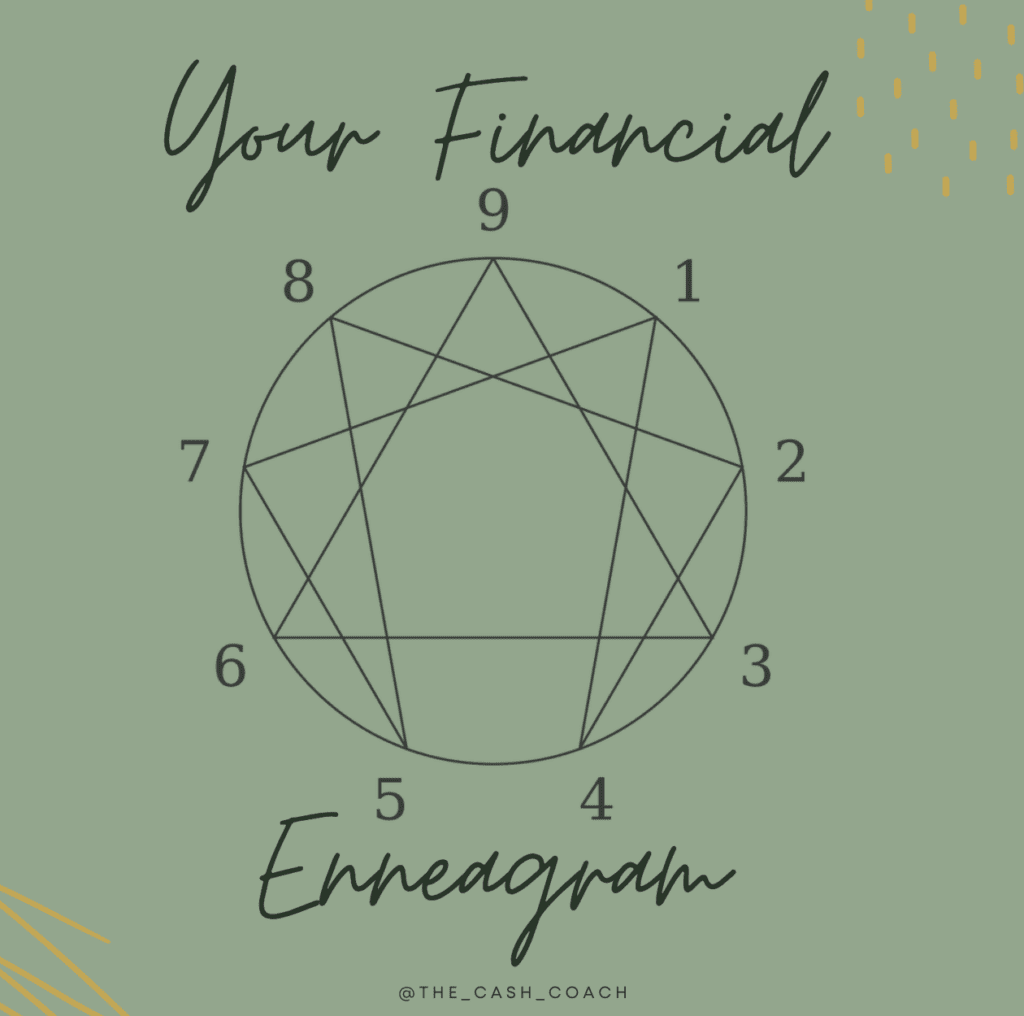The Enneagram is a personality typing system that describes patterns in how people interpret the world and manage their emotions.
The Enneagram describes nine personality types and maps each of these types on a nine-pointed diagram which helps to illustrate how the types relate to one another.

Here’s a quick overview of each type:
- The Reformer – “I must be a good person and do the right thing.”
- The Helper – “I am as lovable as I am helpful.”
- The Achiever – “I must always be working toward success.”
- The Individualist – “I need to find my unique purpose.”
- The Investigator – “The world is an invasive place and I need to protect my energy.”
- The Loyalist – “I will be OK as long as I can find certainty.”
- The Enthusiast – “I will be OK as long as I stay satisfied and keep my options open.”
- The Challenger – “The world is a dangerous place and only the strong survive.”
- The Peacemaker – “I will be OK as long as I preserve my peace of mind.”
Every type has their own set of strengths and weaknesses, and the beauty of the Enneagram is that it removes shame from the equation. It isn’t about placing judgment but rather understanding our fears, motivations, and behaviors to grow.
Enneagram + Money
Of course, our view of the world dramatically affects how we view, manage and relate to our money too.
Below I’ve listed a few strengths, weaknesses, and tips for you to better understand how your Enneagram type can influence your money behaviors. Enjoy!
Enneagram One – The Reformer
Ones tend to save versus spend and want to make sure they have enough money for the future.
- In a Nutshell: Reformers are deemed the “perfectionists” of the Enneagram, so you are likely to approach money by guiding principles and a need for structure.
- Financial Strengths: Budgeting comes very easy to you and you love the numbers. Not a lot of Ones are in debt. You create a plan and stick to it.
- Financial Weaknesses: You can be rigid with money. You might be overcritical with others and yourself on how to spend their money.
- Note from Coach MacKallyn: You don’t need to have a perfect budget right away. Start with one step at a time and keep building. The truth is a “perfect” budget that gets all the numbers right the first time, but rather the one who sticks with it for the long haul.
Enneagram Two – The Helper
Twos may think of money as a way to care for loved ones or create opportunities to connect, rather than a goal in itself. They often focus all of their attention on the needs of others while ignoring their own needs at the same time.
- In a Nutshell: You are likely to overspend on others emotionally.
- Financial Strengths: You see money as a tool and not a status. You are very dependable and people go to you when they need help.
- Financial Weaknesses: You may feel guilty for enjoying your money. Saving is not always high on your priority list, which can really put you in a pickle for long-term goals.
Note from Coach MacKallyn: I highly recommend “ Helpers” create a savings bucket through Ally (read how here) and use this tool as a budget to ensure your generosity isn’t overextending yourself. This way, you can also have a clearer idea of how much they are spending. I also recommend that when creating a budget, you make it a point to focus on including your own wants.
Enneagram Three – Achiever
Enneagram Threes are often high earners who see money as a “significant” driver in everything they do. Threes are often concerned with status and outward appearance.
- In a Nutshell: Achievers’ are the “goal diggers” and “hashtag girl bosses” of Enneagram. Your greatest fear is being worthless, and you are motivated by a need to feel valuable and successful.
- Financial Strengths: Goal crushing machines! You want to be a model of what’s possible for others.
- Financial Weaknesses: You can be afraid to ask for help; you think you need to do it all on your own. You also may tend to spend money on status to hide reality. In this case, the instant gratification spiral can quickly take over.
- Note from Coach MacKallyn: Most of my type threes have a “go hard or go home” type mentality. Be careful when it comes to your budget because often, I find threes’ burnout. Three’s will be great with their budget for a while (go hard!), then get burnt out and want a reward for all of their hard work (go home!). The budget gets thrown out the window and all that hard work is lost. Try to avoid this pendulum swing by making purchase pause a habit. During your purchase pause ask yourself these questions: Is this to impress others? Is it to keep up with a trend? If no one sees what I buy, do I still want it? The clearer you are on your priorities, the more you’ll be able to invest in things you love!
Enneagram Four – Individualists
Fours may be more guided by their emotions in managing money, spending on the things that appeal to them instead of budgeting or being disciplined.
- In a Nutshell: You might identify yourself as a spender. You may be more inclined to emotional spending due to your habit of following feelings rather than acknowledging facts.
- Financial Strengths: You don’t let money control your life. You are not stressed about money. You don’t need to spend money to attain a status quo or impress others.
- Financial Weaknesses: You probably tend to avoid budgeting due to a lack of interest. You may pay too little attention to money and therefore end up spending emotionally.
- Note from Coach MacKallyn: Try not to think of budgeting as restrictive. Get creative! Create a budget that allows flexibility and guardrails.
Enneagram Five – The Investigator
Fives tend to stress about not having enough money for the future even though many self-identify as a saver.
- In a Nutshell: Type fives value research, insight, and becoming an expert. This can cause you to spend a lot of time filling your information cups and not implementing the things you learn.
- Financial Strengths: You enjoy optimizing your budget and learning new tips and tricks. You do not care about social validation.
- Financial Weaknesses: You know the numbers but ignore the behavior behind the habits and desires. You may not follow through on your goals.
- Note from Coach MacKallyn: I encourage type fives to set a limit to your research. Otherwise, you are likely to stay in your cozy research bubble and forget why you started researching in the first place—to change your habits. Bring people into your journey; you need a robust support system to hold you accountable.
Enneagram Six – The Loyalist
Six may worry they won’t have security in the future if they don’t save enough today.
- In a Nutshell: Loyalists are Enneagram’s “safety first” and “what ifs.” But for all interests and purposes, you’re likely good with money; you just need to learn to have more fun with it.
- Financial Strengths: Affirmation from outside sources gives you motivation and the strength to follow your money goals.
- Financial Weaknesses: You may feel that no amount of savings will make you feel secure.
- Note from Coach MacKallyn (IT’S ME!): Be aware of who you are getting money advice from and don’t be afraid to own your voice and opinions. Don’t equate your worth to your financial stability. Release the pressure to stay consistent forever and allow yourself the flexibility at the beginning to change your mind if you need to.
Enneagram Seven – The Enthusiast
Sevens “life of the party” are the adventurers of the Enneagram, so it makes total sense they spend a lot on travel—and they’ve been very pleased with those purchases.
- In a Nutshell: You are a bit more impulsive when it comes to spending and tends to feel the force of #FOMO.
- Financial Strengths: You have a beautiful abundance mindset and use money as a tool to be very social. You feed off the energy of others and that helps you stay on track.
- Financial Weaknesses: You probably think more about short-term strategies but not long-term goals with money. You are not thrilled about the idea of budgeting, saving, or investing because it will make you have to face their financial flaws and position.
- Note from Coach MacKallyn: Automatic transfers to savings, retirement and your bills are your friend! Set those up today!
Type Eight – The Challenger
Challengers tend to be high earners who are pretty motivated by money. Although Eights aren’t stereotypically image-conscious, their primary driver is to seek control and power.
- In a Nutshell: Out of all the types, you are most likely to say money is a “significant” motivator. You see financial status as a symbol of power and influence.
- Financial Strengths: You resist being indebted to anyone. You always have a lot of options and want control of your money. If you feel indebted to someone else, there is a loss of power.
- Financial Weaknesses: “Go big or go home with money.” You may have trouble asking for help.
- Note from Coach MacKallyn: Be vulnerable and ask for help if you need assistance and be open-minded to different approaches around money.
Enneagram Nine – The Peacemaker
The Peacemakers aren’t much for showing off or putting themselves out to gain acclaim, and their attitude towards money follows suit.
- In a Nutshell: Nines are the least likely of all the types to say money is a “very important” motivator in your lives. You see money as just a means to an end and are motivated to have just enough of it to keep life simple.
- Financial Strengths: You are very patient and are willing to delay gratification of material goods. You don’t worry or stress about finances.
- Financial Weaknesses: When you have to do something outside of your comfort zone to reach your goal, you look for a way around it, stall it, or procrastinate. You will make financial decisions not based on what is best for you but on what will bring about the least amount of conflict.
- Note from Coach MacKallyn: Plaster your refrigerator or mirror with your goal written out. This will help you not get distracted by other people’s thoughts and goals. The best thing for a nine is to find step-by-step instructions and commit to following them one step at a time.
To Enneagram... or not?
Can a person be boiled down to a number? Of course not. And this isn’t a rigid blueprint for your financial life. However, if the budget sheets aren’t working and the willpower to stop spending isn’t happening, consider this a fun tool for developing habits best to fit your needs, fears, and desires.
Want more fun financial insights delivered to your inbox?
Meet MicKallyn

Hi, I’m MicKalyn, a Mortgage Lender/Banker turned Financial Coach. When student loans put me in debt, I know I didn’t want to live the rest of my life paying them off, so I figured out how to pay them all off in just a year. Now I have zero debt, 3 homes, 4 college degrees and raising two little boys. I’ve traveled to over 22 countries and live a debt-free life. I’m committed to helping others do the same through 1-on-1 private coaching.





